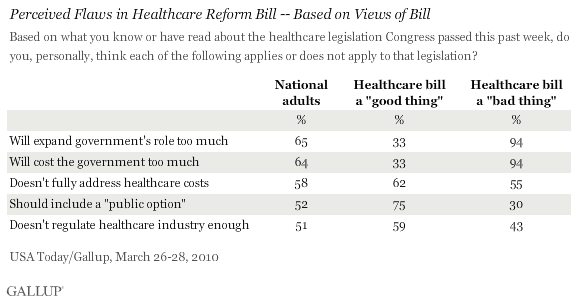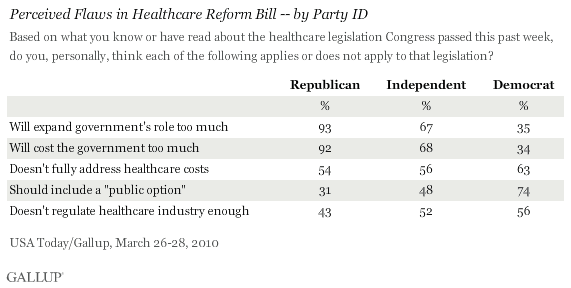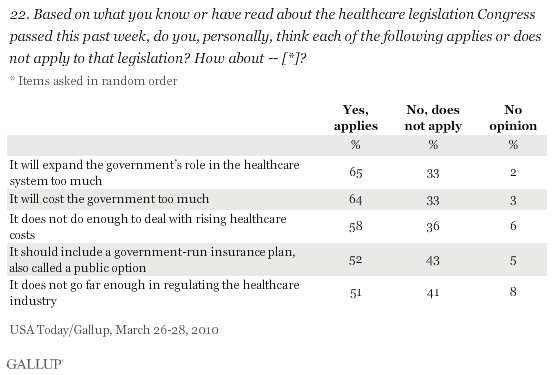PRINCETON, NJ -- Proponents, as well as opponents, of the new healthcare reform law think the legislation is less than perfect. Both groups agree that the bill didn't do enough to deal with rising healthcare costs. Apart from this, however, they perceive very different types of flaws.

Forty-seven percent of Americans polled by USA Today/Gallup March 26-28 say it is a good thing the plan passed, while 50% call it a bad thing.
Three-quarters of the "good thing" group believe the law should include a government-run insurance plan, or public option. Also, 6 in 10 (59%) say it doesn't go far enough in regulating the healthcare industry.
These findings -- in particular the large majority still desiring a public option -- could explain why more advocates of the reform bill do not feel "enthusiastic" about it. According to Gallup polling conducted immediately after passage, most supporters of the bill said they were "pleased" rather than "enthusiastic" (66% vs. 29%). By contrast, nearly as many opponents of the bill were "angry" as "disappointed" (46% vs. 52%).
Opponents of the plan -- those calling passage a "bad thing" -- are in near-total agreement that the bill goes too far in expanding the government's role in the healthcare system and that it will cost the government too much.
Independents See the Most Flaws
In addition to sharing Republicans' and Democrats' concerns about the bill's failure to address healthcare costs, and sharing Republicans' concerns about government intervention and costs, the majority of independents agree with Democrats that the bill doesn't do enough to regulate the healthcare industry. As a result, independents concur with four of the five critiques tested, one more than members of either political party do.

Implications
A week after the voting ended, the partisan lines in the battle over healthcare reform are drawn as sharply as ever. However, the public consensus on the need to address the rising costs in healthcare may light the way forward. If Republican and Democratic leaders can agree on the best approaches for achieving meaningful efficiencies in the healthcare system, that could ultimately bring down the government's costs and obviate the need for greater government involvement in healthcare, thereby bringing the two sides closer together.
Survey Methods
Results are based on telephone interviews with 1,033 national adults, aged 18 and older, conducted March 26-28, 2010. For results based on the total sample of national adults, one can say with 95% confidence that the maximum margin of sampling error is ±4 percentage points.
Interviews are conducted with respondents on land-line telephones (for respondents with a land-line telephone) and cellular phones (for respondents who are cell-phone only).
In addition to sampling error, question wording and practical difficulties in conducting surveys can introduce error or bias into the findings of public opinion polls.

